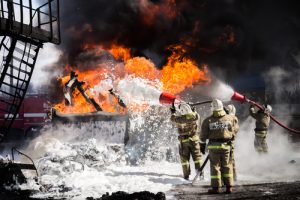
U.S. Sen. Cory Gardner (R-CO) recently proposed bipartisan legislation aimed at protecting firefighters and emergency responders from exposure to toxic chemicals known as per- and polyfluoroalkyl substances (PFAS), which cause major health problems, including cancer.
“Our firefighters and emergency responders in Colorado and around the country risk everything to protect our communities,” Sen. Gardner said. “It is our duty to make sure they are educated on the best ways to avoid and mitigate any PFAS exposure during emergency response and training activities.”
Sen. Gardner on July 31 cosponsored the Protecting Firefighters from Adverse Substances Act of 2019, S. 2353, with U.S. Sen. Gary Peters (D-MI) to direct the Federal Emergency Management Agency (FEMA) to develop guidance for firefighters and other emergency response personnel on best practices to protect them from PFAS exposure and to limit and prevent the release of PFAS into the environment, according to the congressional record summary.
PFAS are a group of man-made chemicals that are very persistent in the environment and in the human body — meaning they don’t break down and they may accumulate over time, according to the U.S. Environmental Protection Agency, which says there is evidence that PFAS exposure can lead to adverse human health effects.
Firefighters face disproportionately high levels of PFAS exposure because the chemicals are a common ingredient in firefighting foams and personal protective equipment, according to Sen. Gardner’s office, which noted that S. 2353 also would require FEMA guidance on alternative foams and personnel protective equipment that do not contain PFAS.
“PFAS contamination is a serious issue facing our communities,” said Sen. Gardner. “I will continue working to make sure Coloradans are provided with the most up to date information concerning PFAS as research regarding their effects on human health continues.”
The International Association of Fire Fighters and the International Association of Fire Chiefs both support the bill.



